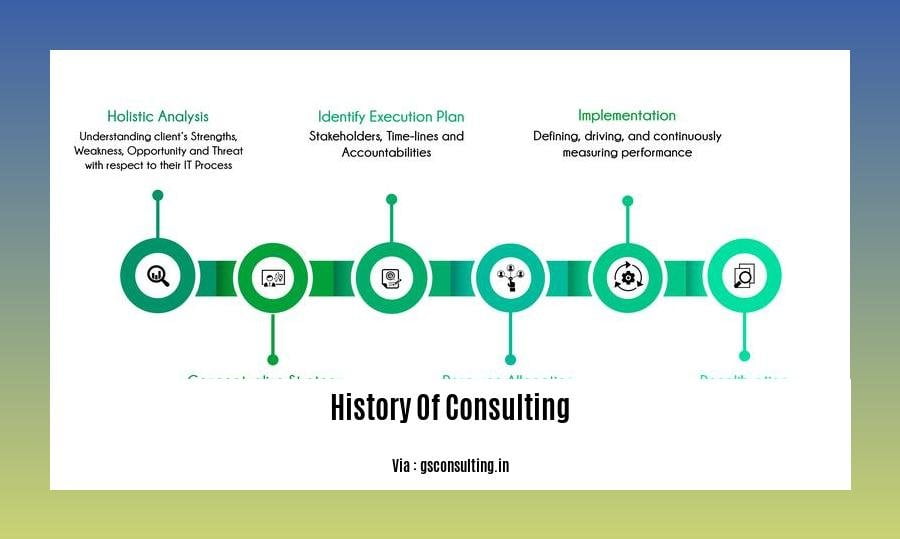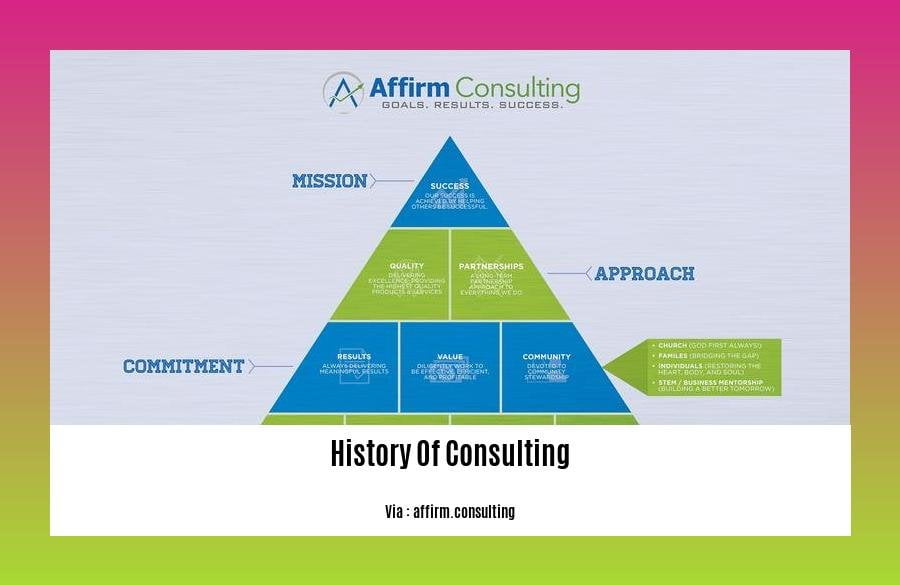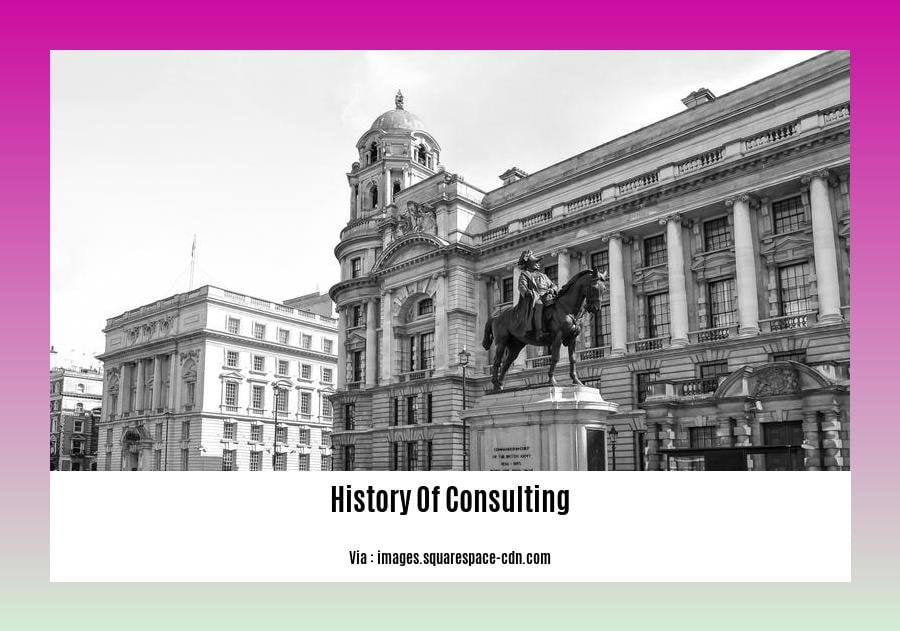-⠀⠀
Key Takeaways:
- Management consulting firms emerged in the late 19th/early 20th century due to a need for process and machinery expertise.
- The first management consulting firm, founded by Arthur Dehon Little in 1886, specialized in technical research.
- The consulting industry grew in the UK in the mid-20th century with the arrival of US firms and new management techniques.
- Strategy and specialization became popular in the consulting industry in the late 20th century.
- The industry has recently focused on digital transformation.
History Of Consulting

The history of consulting is a fascinating journey that spans centuries, evolving alongside the ever-changing needs of businesses and organizations.
The Early Days
The seeds of consulting were sown in the late 19th century when businesses began seeking external expertise to rationalize their operations and enhance efficiency. One of the earliest pioneers was Arthur Dehon Little, who founded the first management consulting firm in 1886.
The Rise of Strategy and Specialization
By the mid-20th century, the consulting industry had gained significant traction in the UK, fueled by the arrival of US firms and the adoption of new management techniques. Strategy and specialization became key drivers of growth, with consulting firms branching out into various areas such as marketing, finance, and human resources.
The Digital Revolution
The late 20th century saw the advent of digital transformation, which had a profound impact on the consulting industry. Firms began leveraging technology to enhance their research, data analysis, and client engagement capabilities. This led to the emergence of specialized consulting services focused on digital strategy, cloud computing, and data analytics.
Recent Trends
In recent years, the consulting industry has continued to evolve rapidly. The focus has shifted towards providing tailored solutions that address the unique challenges faced by businesses in an increasingly interconnected and globalized world. Artificial intelligence, automation, and data-driven insights have become integral to the consulting toolkit.
Embark on a historical voyage to understand the origins and evolution of Navigant Consulting by clicking here.
Uncover the captivating history of Guidehouse by delving into its rich past here.
Journey through time to trace the lineage of Consulting Firms and their impact on the industry by exploring here.
Rise of IT Consulting and Digital Transformation
Information technology consulting has played a pivotal role in the transformation of businesses over the last few decades. As technology became an indispensable part of operations, IT consulting emerged to help organizations leverage digital services and processes for competitive advantage.
Key Concepts
Digital transformation in IT consulting involves:
- Creating innovative digital business models
- Managing the operational aspects of digital transformation
- Defining measurable goals and metrics for success
Impact on IT Consultants
The rise of IT consulting has transformed the job profile of IT professionals, making technology a strategic core for companies. IT consultants now play a crucial role in:
- Developing IT strategies
- Implementing digital solutions
- Advising on technology investments
- Providing ongoing support and maintenance
Key Takeaways:
- Digital transformation has led to an increased demand for IT consulting services.
- IT consultants have become essential partners in helping organizations navigate the digital landscape.
- The industry continues to evolve rapidly, with new technologies and trends shaping the future of IT consulting.
Sources:
- IET Research: Digital Transformation in IT Consulting
- Springer: The Digital Transformation of IT Consulting
Recent Innovations in Consulting

Recent years have witnessed a surge of innovations in the consulting industry, driven by technological advancements and evolving business needs. These innovations are reshaping the way consultants approach problem-solving and deliver value to clients.
Artificial Intelligence (AI) and Machine Learning (ML): AI and ML are transforming the consulting landscape by enabling consultants to process and analyze vast amounts of data, identify patterns, and make more informed decisions. This has led to the development of new services and solutions that address complex business challenges.
Cloud Computing: Cloud computing has made it possible for consultants to access and share data and insights in real-time, regardless of their location. This has enhanced collaboration and efficiency, enabling consultants to provide more timely and responsive services.
Data Analytics and Visualization: Data analytics and visualization tools have empowered consultants to transform raw data into meaningful insights that can be easily understood and communicated to clients. This has improved decision-making and increased the impact of consulting engagements.
Digital Transformation: Digital transformation has been a major driver of innovation in the consulting industry. Consultants are helping clients navigate the complexities of digital transformation, from developing digital strategies to implementing new technologies. This has created new opportunities for consultants to provide value and support clients in their digital journeys.
Key Takeaways:
- AI and ML: AI and ML are revolutionizing the way consultants analyze data and make decisions.
- Cloud Computing: Cloud computing enhances collaboration and efficiency for consultants.
- Data Analytics and Visualization: These tools transform data into actionable insights.
- Digital Transformation: Consultants play a crucial role in helping clients navigate digital transformation.
Sources:
- McKinsey: The Future of Consulting
- Forbes: 5 Ways Technology Is Transforming the Consulting Industry
Future of the Consulting Industry
Consulting, a profession rooted in antiquity, continues to evolve at an accelerated pace. Today, technology, data, and innovation drive the industry forward, shaping its future trajectory.
Digital Transformation and Automation:
Digitalization transforms the way businesses operate, creating new challenges and opportunities. Consultants who embrace advancements like AI, big data, and cloud computing will remain competitive.
Data-Driven Insights:
Data is the lifeblood of modern consulting. Consultants with expertise in data analysis and interpretation can provide valuable insights and help clients make informed decisions.
Specialization and Niche Expertise:
The consulting landscape is becoming increasingly specialized. By developing deep expertise in particular industries or functional areas, consultants can provide customized solutions that meet specific client needs.
Remote Work and Flexibility:
Remote work is redefining the consulting profession. Consultants can now collaborate and deliver services from anywhere, fostering flexibility and accessibility for both clients and consultants.
Sustainability and Social Impact:
Sustainability and social impact are becoming increasingly important considerations for clients. Consultants who can help businesses align their operations with ESG goals will be in high demand.
Key Takeaways:
- Digital transformation is redefining consulting services and creating new opportunities.
- Data analytics and interpretation are critical skills in the modern consulting landscape.
- Specialization and niche expertise enable consultants to provide tailored solutions for specific client needs.
- Remote work and flexibility are shaping the future of consulting.
- Sustainability and social impact are emerging areas of focus in the consulting industry.
Sources:
- The Digital Transformation of Consulting: A Strategic Overview
- The Future of Consulting: What the Next Decade Holds
FAQ
Q1: How did digital transformation impact the consulting industry?
A1: Digital transformation led to the emergence of new consulting services, technological advancements, and a focus on data analytics, AI, and cloud computing.
Q2: What are the key concepts characterizing the digital transformation of IT consulting?
A2: Key concepts include the creation of digital business models, management of operational aspects of digital transformation, and identification of measurable goals and metrics for success.
Q3: How did management consulting emerge?
A3: Management consulting emerged in the late 19th century due to demand for work rationalization, process and machinery expertise, and technical research.
Q4: What was the role of US consulting firms in the growth of the consulting industry in the UK?
A4: US consulting firms played a significant role in the growth of the consulting industry in the UK by introducing new management techniques and establishing a presence in the market.
Q5: How has the consulting industry evolved since its inception?
A5: The consulting industry has evolved from a focus on operational efficiency and scientific management to strategy consulting, specialization, and digital transformation, adapting to changing business needs and technological advancements.
- China II Review: Delicious Food & Speedy Service - April 17, 2025
- Understand Virginia’s Flag: History & Debate - April 17, 2025
- Explore Long Island’s Map: Unique Regions & Insights - April 17, 2025
















